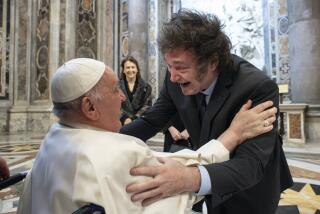Pope Francis I is Argentine Jesuit known as austere modernizer
Roman Catholic cardinals chose Jorge Mario Bergoglio as pope Wednesday, selecting the Argentine Jesuit to succeed Pope Benedict XVI, who resigned Feb. 28, and lead 1.2 billion church followers around the globe. He was chosen after five rounds of voting in the Sistine Chapel.
Bergoglio, who chose the papal name Francis I, is the first Jesuit pope and has spent nearly his entire career in Argentina, overseeing churches and shoe-leather priests.
The Associated Press described him as a modernizer who has lived austerely. Here is the full text from the AP:
Bergoglio, 76, reportedly got the second-most votes after Joseph Ratzinger in the 2005 papal election, and he has long specialized in the kind of pastoral work that some say is an essential skill for the next pope. In a lifetime of teaching and leading priests in Latin America, which has the largest share of the world’s Catholics, Bergoglio has shown a keen political sensibility as well as the kind of self-effacing humility that fellow cardinals value highly, says his official biographer, Sergio Rubin.
Bergoglio would likely encourage the church’s 400,000 priests to hit the streets to capture more souls, Rubin said in an Associated Press interview. He is also most comfortable taking a low profile, and his personal style is the antithesis of Vatican splendor. “It’s a very curious thing: When bishops meet, he always wants to sit in the back rows. This sense of humility is very well seen in Rome,” Rubin said.
Bergoglio is known for modernizing an Argentine church that had been among the most conservative in Latin America....
Bergoglio stands out for his austerity. As Argentina’s top church official, he’s never lived in the ornate church mansion in Buenos Aires, preferring a simple bed in a downtown room heated by a small stove on frigid weekends. For years, he took public transportation around the city, and cooked his own meals.
FULL COVERAGE: Choosing a pope
Bergoglio has slowed a bit with age and is feeling the effects of having a lung removed due to infection when he was a teenager — two strikes against him at a time when many Vatican-watchers say the next pope should be relatively young and strong. “But he’s going to be very influential in the congress of cardinals, one of those who is most listened to,” Rubin said. ...
Bergoglio couldn’t prevent Argentina from becoming the first Latin American country to legalize gay marriage, or stop its president, Cristina Fernandez, from promoting free contraception and artificial insemination. When Bergoglio argued that gay adoptions discriminate against children, Fernandez compared his tone to “medieval times and the Inquisition.”
This kind of demonization is unfair, says Rubin, who wrote Bergoglio’s authorized biography, “The Jesuit.”
“Is Bergoglio a progressive — a liberation theologist even? No. He’s no Third World priest. Does he criticize the International Monetary Fund, and neoliberalism? Yes. Does he spend a great deal of time in the slums? Yes,” Rubin said.
Critics also accuse him of failing to stand up publicly against the country’s military dictatorship from 1976-83, when victims and their relatives often brought firsthand accounts of torture, death and kidnappings to the priests he supervised as leader of the Jesuit order in Argentina.
Like other Jesuit intellectuals, Bergoglio has focused on social outreach. Catholics are still buzzing over his speech last year accusing fellow church officials of hypocrisy for forgetting that Jesus Christ bathed lepers and ate with prostitutes.
“In our ecclesiastical region there are priests who don’t baptize the children of single mothers because they weren’t conceived in the sanctity of marriage,” Bergoglio told his priests. “These are today’s hypocrites. Those who clericalize the church. Those who separate the people of God from salvation. And this poor girl who, rather than returning the child to sender, had the courage to carry it into the world, must wander from parish to parish so that it’s baptized!”
Bergoglio compared this concept of Catholicism to the Pharisees of Christ’s time: people who congratulate themselves while condemning others.
“Jesus teaches us another way: Go out. Go out and share your testimony, go out and interact with your brothers, go out and share, go out and ask. Become the Word in body as well as spirit,” Bergoglio said.
ALSO:
Conservative brand of Catholicism thrives in Africa
China hacker’s angst opens a window onto cyber-espionage
‘The Borgias’ upsets some in Italy as vote for new pope underway
More to Read
Sign up for Essential California
The most important California stories and recommendations in your inbox every morning.
You may occasionally receive promotional content from the Los Angeles Times.










